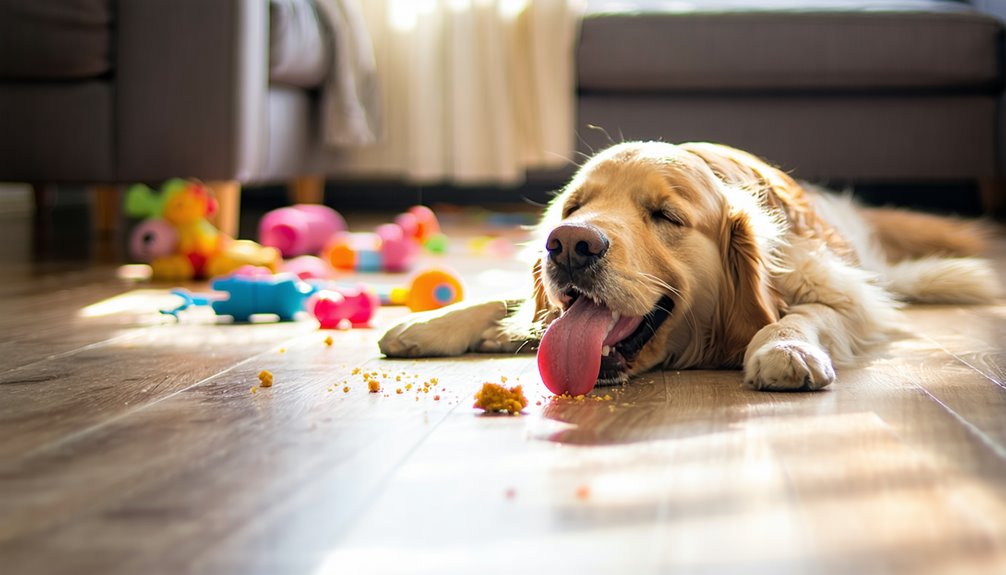If your dog's licking the floor, it could be due to various factors. Often, dogs lick surfaces out of instinct as they explore their environment, looking for food remnants or new scents. However, it might also indicate boredom or a desire for your attention. Sometimes, excessive licking can signal underlying health concerns, like gastrointestinal discomfort or oral issues. Environmental factors, like enticing smells, can also trigger this behavior. If this licking persists or is accompanied by other troubling signs, it's wise to reflect on further insights to guarantee your furry friend stays healthy and happy.
Natural Instincts at Play
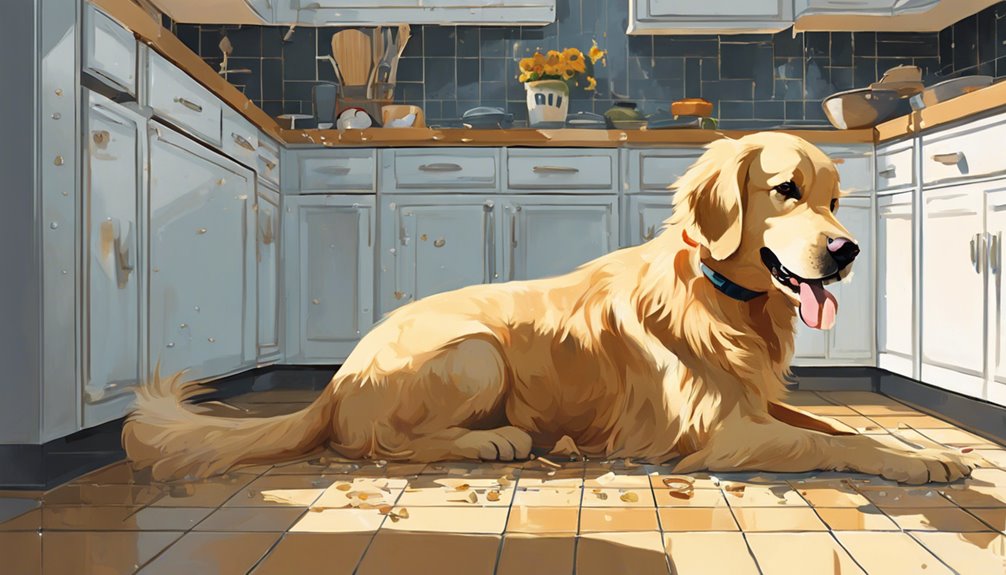
When you see your dog licking the floor, it might seem puzzling, yet it often stems from their natural instincts. This behavior can be traced back to their ancestors, who relied on natural hunting skills for survival. Dogs have an instinctual behavior to explore their environment through taste and smell, which can lead them to lick surfaces that catch their attention. They might be detecting remnants of food, or they could simply be satisfying their curiosity. This instinctual licking can also help them gather information about their surroundings, much like they would in the wild. Understanding this behavior can foster a deeper connection with your dog, allowing you to appreciate their unique nature while ensuring they're healthy and happy.
Seeking Attention From Owners
Why might your dog be licking the floor? One possibility is that they're engaging in attention-seeking behaviors. When your furry friend licks the floor, it could be their way of trying to grab your attention, especially if they notice that it elicits a reaction from you. This behavior might become more pronounced if they feel neglected or require more owner interaction. Dogs are social creatures, and they thrive on connection with their humans. If you find your dog licking the floor, consider whether they might be feeling bored or anxious. Providing them with more playtime, affection, or interactive toys can help redirect their focus and strengthen your bond. Understanding their needs is essential for a happy, fulfilling relationship.
Exploring New Scents
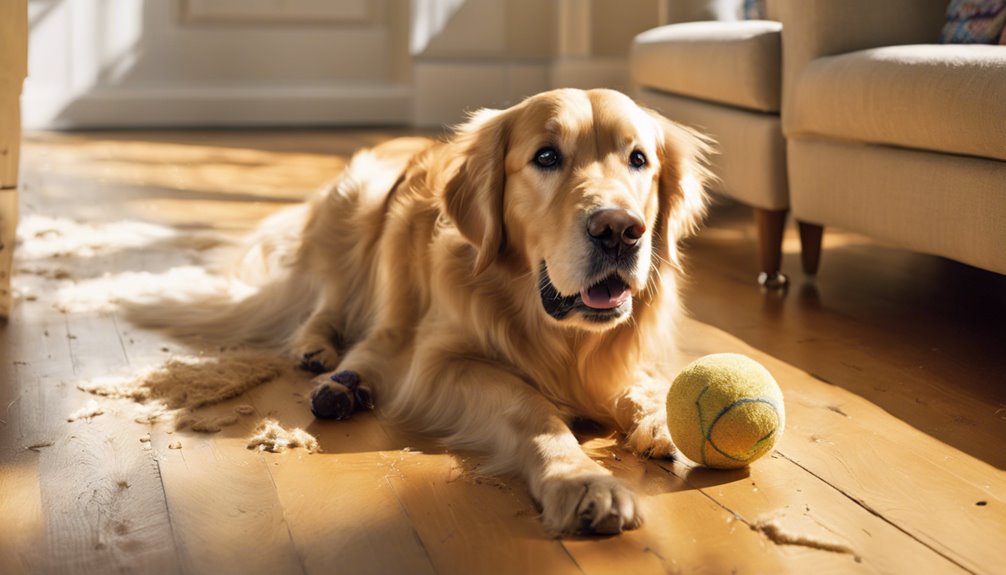
Although it may seem puzzling, your dog's floor-licking behavior can often be attributed to their instinctual drive to explore new scents. Dogs experience the world through their powerful sense of smell, which is far more acute than ours. When they lick the floor, they're engaging in scent exploration, fueled by their natural curiosity driven behavior. They might be detecting remnants of food, other animals, or even pheromones left behind. This behavior not only satisfies their curiosity but also allows them to gather information about their environment. Understanding this instinct can help you appreciate your dog's actions more deeply, acknowledging that their licking is a way of connecting with the world around them. Embracing this behavior can lead to a better bond between you and your furry friend.
Taste of Food Residues
You might notice your dog licking the floor because they're picking up on food crumbs or spills you didn't even see. The lingering scents and tastes can be incredibly enticing for them, driving their curiosity and instinct to explore. Understanding this behavior can help you keep your space cleaner and guarantee your dog stays healthy.
Food Crumbs Attraction
Many dogs are naturally drawn to the floor, often sniffing and licking in search of tasty morsels left behind. It's part of their instinctual behavior to hunt for food residue, especially if you have any cleaning habits that might leave crumbs around. Here's a quick look at why your pup might be attracted to the floor:
| Reason | Possible Food Sources | Cleaning Habits Impact |
|---|---|---|
| Crumbs from meals | Leftover human food | Infrequent sweeping |
| Treats dropped | Dog snacks | Spot cleaning only |
| Spilled drinks | Liquids with sugar | Mopping neglected |
| Kitchen activity | Cooking remnants | Cluttered surfaces |
| Playtime snacks | Chews or toys | Limited tidying |
Understanding these triggers can help you manage your dog's floor-licking habits more effectively.
Scent of Spills
The scent of spills can be a powerful lure for dogs, enticing them to lick the floor in search of lingering food residues. Dogs possess extraordinary scent detection abilities, allowing them to pick up aromas that we often overlook. When a spill occurs, your dog might engage in what you could call a spill investigation, fervently exploring every inch of the affected area. They're not just cleaning up; they're following their instincts to uncover hidden flavors. This behavior can be endearing, but it's crucial to ascertain these spills don't contain harmful substances. Understanding your dog's motivations can help you create a cleaner, safer environment while satisfying their natural curiosity. After all, freedom for your dog includes the freedom to explore and indulge their senses.
Anxiety and Stress Responses
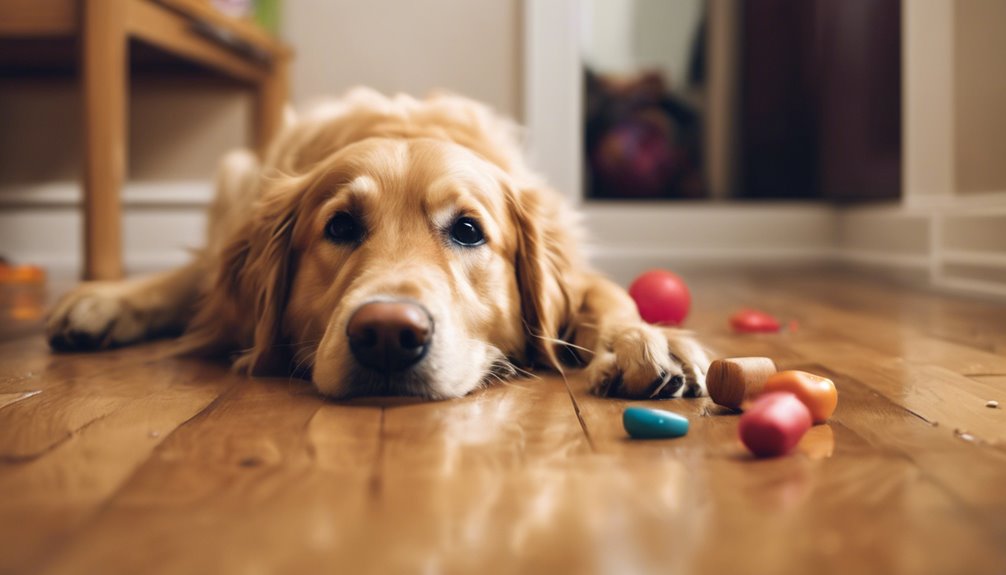
While dogs often lick the floor for various reasons, anxiety and stress can greatly contribute to this behavior. When they're feeling overwhelmed, they might turn to licking as a coping mechanism. It's crucial to identify possible anxiety triggers in their environment, such as:
- Loud noises, like thunderstorms or fireworks
- Changes in routine or household dynamics
- Separation from you or other pets
- Unfamiliar situations or places
Understanding these triggers can help you provide better stress relief for your dog. Consider creating a safe space for them, using calming aids, or incorporating more playtime into their day. By addressing their anxiety, you'll foster a sense of security, reducing the urge to lick the floor and enhancing their overall well-being.
Gastrointestinal Discomfort
If your dog is experiencing gastrointestinal discomfort, licking the floor might be their way of signaling distress. This behavior can often indicate gastrointestinal upset or other digestive issues that require your attention. Dogs may lick surfaces in an attempt to soothe their discomfort or as a reaction to nausea. You should observe for additional signs like vomiting, diarrhea, or changes in appetite, as these could provide further clues about their condition. It's important to understand that while occasional licking might not be concerning, persistent behavior could warrant a visit to the vet. By recognizing these signals, you empower yourself to respond effectively, ensuring your furry friend gets the care they need to feel better and enjoy their freedom.
Oral Health Issues
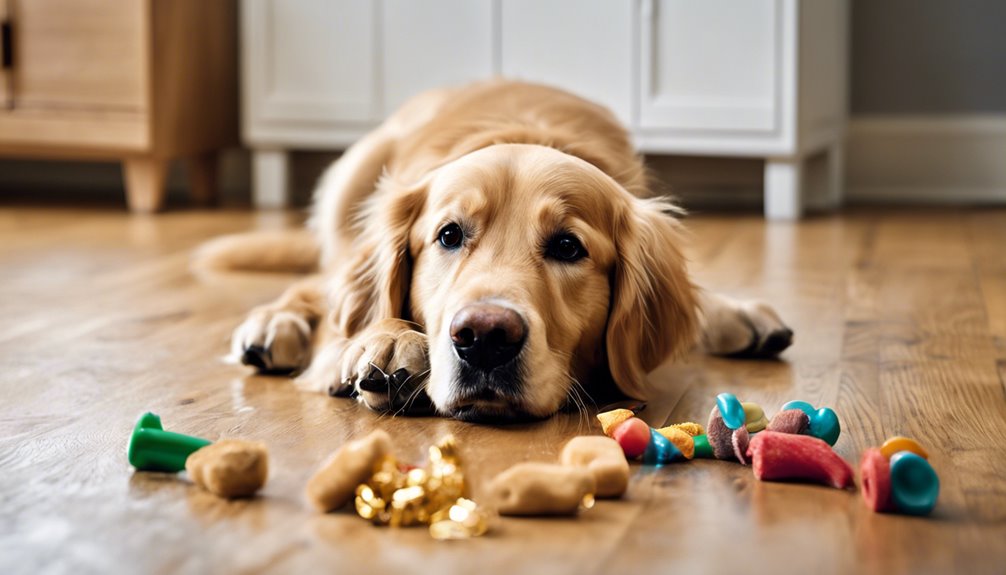
Gastrointestinal issues aren't the only reason your dog might be licking the floor; oral health problems can also play a significant role. If you notice this behavior, consider these potential dental issues:
- Plaque and Tartar Buildup: Poor oral hygiene can lead to painful dental problems.
- Gum Disease: Inflamed gums can cause discomfort, prompting your dog to lick.
- Tooth Decay: Cavities may create a persistent urge to lick the floor for relief.
- Oral Injuries: Cuts or wounds in the mouth can lead to excessive licking.
Addressing these issues promptly is vital for your dog's well-being. Regular dental check-ups and maintaining good oral hygiene can help prevent these problems and guarantee your furry friend stays healthy and happy.
Behavioral Compulsions
Sometimes, your dog may lick the floor as a response to stress or anxiety, reflecting a behavioral compulsion rather than a physical issue. Identifying behavioral triggers is vital to understanding this compulsive habit. It's important to recognize when your dog's licking becomes a way to cope with emotional distress.
| Behavioral Trigger | Compulsive Habit | Potential Solutions |
|---|---|---|
| Loud noises | Excessive licking | Provide a safe space |
| Changes in routine | Repetitive behaviors | Establish consistency |
| Lack of stimulation | Pacing and licking | Increase exercise |
| Separation anxiety | Licking and chewing | Gradual desensitization |
Environmental Factors
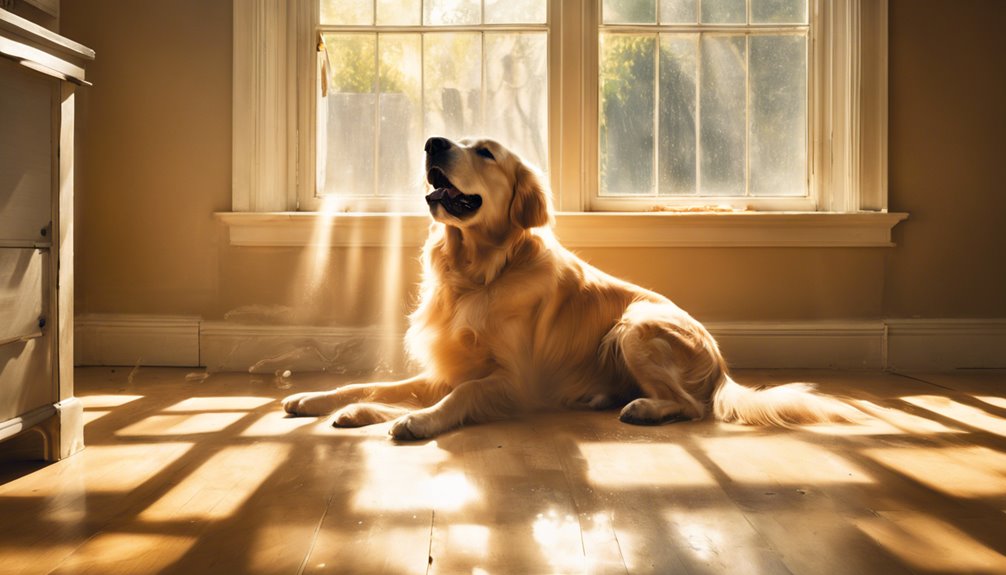
If your dog's licking the floor, it might be worth considering what's on it. Food crumbs and enticing odors can draw your pup's attention, leading them to explore every inch of the surface. Understanding these environmental factors can help you address the behavior more effectively.
Food Crumbs Presence
Food crumbs scattered across your floor can be a significant trigger for your dog's licking behavior. Dogs are naturally driven to seek out food sources, and even the smallest remnants can pique their interest. If you notice your pup frequently licking, consider these factors:
- Unattended meals: Leftovers can attract your dog's attention.
- Inconsistent cleaning habits: Regularly sweeping and mopping can minimize crumbs.
- Family snacking: Dropped treats or snacks can become a buffet for your dog.
- Curiosity: Sometimes, it's just an exploration of their environment.
Addressing these factors not only curbs the licking but also fosters a cleaner space. By being mindful of your cleaning habits, you can create a more enjoyable environment for both you and your furry friend.
Odor Attraction Factors
Many dog owners might not realize that odors in their environment can considerably influence their pet's licking behavior. Dogs possess an extraordinary ability for odor detection, which often drives them to explore their surroundings in search of enticing scents. Your dog's licking may stem from a strong scent preference for familiar or intriguing odors, whether it's remnants of food, cleaning products, or even natural scents from the environment. This behavior isn't just a quirk; it reflects their instinctual need to gather information about their surroundings. By understanding these odor attraction factors, you can create a more enriching environment for your furry friend, minimizing unwanted licking while satisfying their natural curiosity. A little awareness goes a long way in enhancing your pet's happiness and well-being.
When to See a Vet
Wondering when it's time to consult a vet about your dog's floor-licking behavior? It's crucial to take action if you notice any of the following signs, as they may indicate underlying health concerns:
- Excessive licking that disrupts daily life.
- Changes in appetite or weight.
- Signs of discomfort, such as whining or restlessness.
- Presence of gastrointestinal issues, like vomiting or diarrhea.
If you observe these symptoms, it's wise to schedule a vet visit. Your furry companion's well-being is paramount, and addressing potential health concerns early can lead to more effective treatment. Remember, being proactive is key to ensuring your dog lives a happy, healthy life.
Frequently Asked Questions
Can Certain Dog Breeds Lick Floors More Than Others?
When you think of a dog licking the floor, it's like a puzzle waiting to be solved. Certain breeds may indeed exhibit a higher frequency of this behavior due to their unique licking triggers, which often include boredom or anxiety. Breeds like Labrador Retrievers or Beagles, known for their curious natures, might lick more often. Understanding your dog's specific tendencies can help you address their needs and promote a healthier, happier environment.
Does Floor Material Affect My Dog's Licking Behavior?
Yes, floor material can influence your dog's licking behavior. Different floor textures can evoke varying licking preferences due to their feel or taste. For instance, smooth surfaces like tile or hardwood might attract your dog differently than carpet or rugs. It's crucial to observe your pup's reactions to various materials; this could help you understand their habits better. Consider how your dog interacts with their environment to guarantee they're comfortable and happy.
Is Floor Licking Contagious Among Dogs?
Did you know that over 60% of dog owners report unusual licking habits in their pets? When it comes to floor licking, it's unlikely to be contagious among dogs. While dogs often mimic behaviors they observe, such as licking, this is more about individual dog behavior than an infectious habit. If your dog's licking seems excessive, it might reflect stress or discomfort, so it's wise to consult a vet for guidance.
Can My Dog's Licking Be a Sign of Boredom?
Yes, your dog's licking can definitely be a sign of boredom. Dogs often exhibit boredom signals by engaging in repetitive behaviors, like licking the floor. This might also be an attention-seeking tactic, as they may crave interaction or stimulation. If you notice this behavior, consider providing more exercise or mental challenges for your furry friend. Engaging them in play or training can help alleviate boredom and promote a healthier, happier lifestyle.
Are There Specific Cleaning Products That Deter Dogs From Licking?
Imagine your dog's tongue swirling like a paintbrush across your floor, leaving a trail of slobber. To deter this curious behavior, consider cleaning product safety. Look for natural deterrents like vinegar or citrus-based solutions, which can repel without harmful chemicals. Always guarantee any product you use is safe for pets. By keeping your home clean and safe, you'll create a more inviting space for both you and your furry friend.

